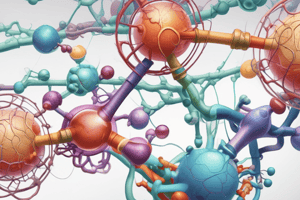Podcast
Questions and Answers
What is the primary function of cofactors in enzyme activity?
What is the primary function of cofactors in enzyme activity?
- To protect the enzyme from inhibitors or degradation
- To participate in the degradation of the enzyme
- To stabilize the enzyme's active site and facilitate substrate binding (correct)
- To increase the enzyme's substrate affinity
Which type of cofactor is responsible for transferring chemical groups or electrons?
Which type of cofactor is responsible for transferring chemical groups or electrons?
- Inorganic cofactors
- Organic cofactors (correct)
- Allosteric activators
- Metal ions
What is the main difference between cofactors and activators?
What is the main difference between cofactors and activators?
- Cofactors are organic, while activators are inorganic
- Cofactors bind to the active site, while activators bind to an allosteric site
- Cofactors are necessary for enzyme activity, while activators increase enzyme activity (correct)
- Cofactors are small molecules, while activators are large molecules
Which of the following is an example of an allosteric activator?
Which of the following is an example of an allosteric activator?
What is the role of metal ions in enzyme activity?
What is the role of metal ions in enzyme activity?
Which of the following is a function of activators?
Which of the following is a function of activators?
Flashcards are hidden until you start studying
Study Notes
Cofactors
- Definition: Cofactors are small molecules or ions that bind to an enzyme and are necessary for its activity.
- Types:
- Inorganic cofactors: metal ions (e.g. Zn²⁺, Mg²⁺, Fe²⁺) or other inorganic molecules.
- Organic cofactors: coenzymes, which are molecules that help transfer chemical groups or electrons.
- Functions:
- Stabilize the enzyme's active site.
- Facilitate substrate binding and catalysis.
- Help to position substrates correctly.
- Participate in electron transfer reactions.
Activators
- Definition: Activators are molecules that increase the activity of an enzyme, often by binding to an allosteric site.
- Mechanisms:
- Increase the enzyme's substrate affinity.
- Alter the enzyme's conformation to increase activity.
- Protect the enzyme from inhibitors or degradation.
- Examples:
- Allosteric activators: molecules that bind to an allosteric site, altering the enzyme's conformation.
- Non-essential activators: molecules that are not required for enzyme activity but can increase its efficiency.
- Metal ions: some metal ions can act as activators, e.g. Mn²⁺ can activate some enzymes.
Studying That Suits You
Use AI to generate personalized quizzes and flashcards to suit your learning preferences.




